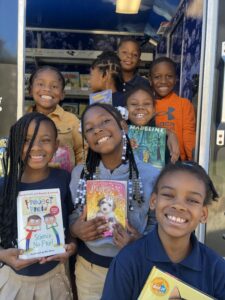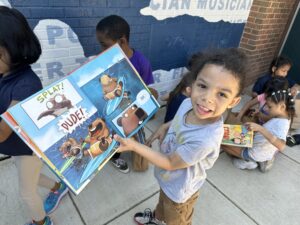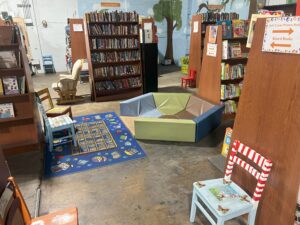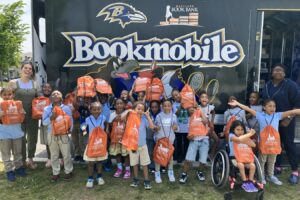Warehouse of Wonders
Maryland Book Bank uses Education grant to increase acces to quality books in under-served communities
Tucked away in an unassuming warehouse in the Woodberry neighborhood of Baltimore City, you will find a magical mix of astronauts, dinosaurs, princesses, and more. This eclectic mix is bound in the pages of thousands of books, donated to, and meticulously sorted by, The Maryland Book Bank with the goal of “expanding equitable access to books within under-resourced schools and communities so that all children can thrive.”
Operating since 2014, the Maryland Book Bank (MBB) cultivates literacy in under-served neighborhoods by increasing access to quality, age-appropriate books in homes, classrooms, and community settings. Students, parents, teachers, and local organizations are given the power to choose age-appropriate books to build their own libraries.
Since their founding, MBB has distributed more than 2 million books into the community through partnerships with more than 800 schools, childcare centers, and community-based organizations. A recent general operating grant from the Knott Foundation, in combination with support from other partners such as the Baltimore Ravens, has helped MBB spread their wings and achieve new heights.
Turning the Page on Access
 Baltimore City saw the largest drop in fourth grade reading scores from 2019-2022 of all major US cities administering the National Assessment of Educational Progress. Only 11% of City fourth graders were considered proficient in reading in 2022, compared to 31% in Maryland and 32% nationally. This lack of reading proficiency by 4th grade has well-researched and profound implications for these students; they are four times less likely to graduate on time than their peers and more likely to experience a widening skills gap across subject areas such as math and science as they progress through school.
Baltimore City saw the largest drop in fourth grade reading scores from 2019-2022 of all major US cities administering the National Assessment of Educational Progress. Only 11% of City fourth graders were considered proficient in reading in 2022, compared to 31% in Maryland and 32% nationally. This lack of reading proficiency by 4th grade has well-researched and profound implications for these students; they are four times less likely to graduate on time than their peers and more likely to experience a widening skills gap across subject areas such as math and science as they progress through school.
While the root causes of low literacy rates are complex, there is a growing body of evidence suggesting a direct tie between exposure to books at a young age and increased educational achievement, attainment, and occupational standing later in life. According to Mark Feiring, Executive Director of MBB, “many young people, especially those attending Title 1 schools in Baltimore City, have limited or no access to books at home, and even public libraries can be difficult to access due to safety concerns and logistical challenges.” Providing books, free of charge, directly through the Maryland Book Bank’s Bookmobile and Home Library Project (HLP) helps bridge this gap and positively impacts academic performance.
Supporting Bookends: The Bookmobile and The Home Library Project
Mark estimates that on average, there is one book in the home of every 300 children living in cities throughout the U.S. “It’s staggering,” he said, stating further, “when I was a kid, I was a big reader and I still am. I knew the importance of books and I remember the excitement of receiving and reading the Scholastic books that came in a box…you always had all those books. And imagine these kids don’t have that standard.”
Mark shared that MBB has “a lot of parents telling us that they are reading cereal boxes or junk mail to their kids because they can’t afford to buy books.” While disheartening to hear, it is unsurprising given that the average cost of a children’s book today is $14.67; a high price when you are trying to meet the essential needs of food and shelter.
Donated by the Baltimore Ravens and adorned with the team’s mascots, The Bookmobile, which was launched in 2016, makes its way through Baltimore City visiting community events, festivals, and summer camps with the goal of getting books into the hands of elementary school students. These aren’t just any books, they are books that these young readers are interested in reading – they are about unicorns, dinosaurs, and sometimes, the adventures of one Captain Underpants. Perhaps most importantly, the books are free, and the students get to make their own selections. Mark loves to see the kids grab a book and sit down and start reading aloud on the curb.
While the work of the Bookmobile is open to all young readers during the summer, during the school year, it turns into the delivery mechanism for MBB’s flagship program, The Home Library Project. Launched in 2017, Maryland Book Bank’s HLP currently partners with 100 of Baltimore City’s 138 Title 1 schools. The goal of HLP is to establish libraries in the homes of every Pre-Kindergarten-2nd grade student, Mark hopes to bring the project to all 138 schools within the next school year.
Title 1 Schools and Title 1 Targeted schools that serve at-risk populations in Baltimore City and County are eligible to apply for participation in the HLP. Those that are accepted receive a visit from MBB’s Bookmobile once per academic year, where students are then able to board the bus and select 10 books that match their interests and abilities to take home.
Closing the Gap and Building Bonds Through Books

Schools that partner with MBB don’t just receive books, they receive guidance and support around how to engage parents in helping their children develop critical literacy skills. “We are not a tutoring program,” said Mark; however, MBB partners with tutoring programs such as Reading Partners to ensure the literacy work is taking place and having an impact.
Although MBB is still working out a plan for a detailed evaluation of MBB’s impact, a small sampling of HLP participant test scores versus non-HLP participant test scores demonstrated an increase in reading proficiency test scores, “in some cases as high as 70%,” said Mark.
Additionally, the parents of the participants are excited. They are thrilled that their children now have books to call their own; books that they can read together. Reading together not only helps young children develop language skills, prepare for academic success, and explore the world through imagination, it also helps build strong emotional bonds. Since launching the HLP, Mark has seen the program “come full circle over time” with parents now approaching MBB to see what books they have for them.
The Need for Mirrors and Money
Reading matters. Representation does as well. Relying primarily on the donation of gently used books from schools, individuals, and publishers, it isn’t surprising that Mark said, “we never know what we’re getting” when a shipment arrives. Often, the donated books do not reflect the faces and lived experiences of the children MBB serves. To ensure they have a supply of books that are more inclusive, MBB must fundraise.
While some estimates put the number of nonprofits in Baltimore City between 3,500 – 5,000, there are far fewer funding organizations. Competition for those funds is strong and the winds of philanthropic interests are often shifting. To help counter these realities, MBB established a Community Membership Program whereby community members can pay $45 a year and shop for all the books they want or need. This is especially helpful for teachers, who often rely on MBB to fill a classroom library, or as Mark shared, a school where the library had zero books; MBB helped them secure 1,000 to start over.
The Next Chapter
Since moving into their home in Woodberry in 2018, MBB’s reach, understanding of the need, and operating budget has grown exponentially. This year MBB expects to distribute 520,000 books
to young readers and reach all 138 of Baltimore City’s Title 1 schools. They know from their work that while getting children proficient in reading by grade 4 is important, there is work that needs to be done for children in the middle school years as well. Mark shared that this age group is “kind of left out;” “they are the ones that really are suffering,” and he hopes MBB can address this need in the future.
As for the budget piece, there is no doubt that there is more grant writing in the organization’s future. While Mark feels “fortunate in that over the years he has built some wonderful relationships with the funding community,” he and the larger MBB organization are always looking for opportunities to streamline, cost share, and harness the unbelievable strength of their volunteer base to manage costs.
What appears to be an old warehouse from the outside is actually a gateway to new worlds, self-discovery, and academic success. It serves as the starting point for many young people in Baltimore City, fostering a lifelong love of reading and a deeper understanding of their place in the world. This gateway remains open thanks to the hard work and dedication of the Maryland Book Bank family and the generous financial support of donors, both large and small. Funding for essentials like rent, utilities, and an automatic door lift—such as that provided by the Knott Foundation—may seem mundane, but these investments enable young readers’ imaginations to soar.


